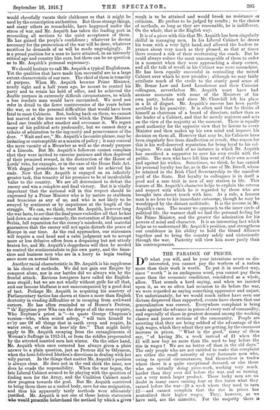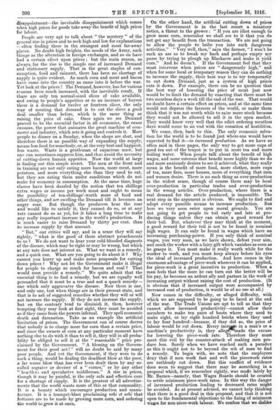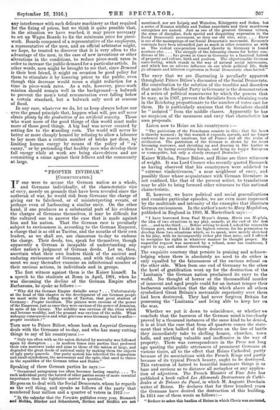THE PARADOX OF PRICES.
increase in prices. What is the good," many of them say, " of having 30s. a week instead of £1 when the £1 will now buy no more than 15s. used to buy before the rise in wages ? We are no better off than in the old days." The only people who are not entitled to make this complaint are either the small minority of very fortunate men who, owing to special circumstances, find themselves in trades where there is a quite exceptional demand, or else those who are virtually doing piece-work, working very much harder than they ever did before the war, and so turning out a very much larger product. These lucky men are no doubt in many cases earning four or five times what they earned before the war—f8 a week where they used to earn E2 — and cannot complain that the rise in prices has neutralized their higher wages. They, however, as we have said, are the minority. For the majority there is disappointment—the inevitable disappointment which comes when high prices for goods take away the benefit of high prices for labour.
People arc very apt to talk about " the mystery " of the general rise in prices and to seek high and low for explanations —often finding these in the strangest and most far-away places. No doubt high freights, the needs of the Army, such things as the alteration in foreign exchanges, and so on have had a certain effect upon prices ; but the main reason, as always, for the rise is the simple one of increased Demand and stationary supply. That in the great staples of con- sumption, food. and raiment, there has been no shortage of supply is quite evident. As much corn and meat and bacon have come into the country as came into it before the war. Yet look at the prices ! The Demand, however, has for various reasons been much increased, with the inevitable result. If there are only ten normal-sized slices of cake available, and owing to people's appetites or to an increase of buyers there is a demand for twelve or fourteen slices, the only way of meeting that demand is to cut the slices a good deal smaller than before, which is the same thing as raising the price of cake. Once again we see Demand proved to be the essential factor in all economics, the causa causans, the power that animates the great machine of com- merce and industry, which sets it going and controls it. More people to dinner on a Sunday, when the shops are shut, and therefore there is no possible way of expanding the supply, means less food for somebody, or, at the very best and happiest, less waste. Waste is a gentleman of capacious maw, but one can sometimes suppress him, and thus avoid the necessity of cutting-down human appetites. Now the world at large is finding out this simple secret. The men at the front and in training arc not only eating more bacon, more meat, more potatoes, and more everything else than they used to eat, but they are eating them under conditions which do not make for economy in consumption. At the same time, huge classes have been dazzled by the notion that ten shillings extra wages or income per week must and ought to mean the possibility of ten-shillings'-worth more of food and other things, and are swelling the Demand till it becomes an angry roar. But though the producers hear the roar and would like to satisfy it, they cannot do so, or at any rate cannot do so as yet, for it takes a long time to make any really important increase in the world's production. It is much easier to raise Demand by thirty per cent. than to increase supply by that amount.
" But," our critics will say, and in a sense they will say rightly, " what is the good of these abstract preachments to us ? We do not want to hear your cold-blooded diagnosis of the disease, which may be right or may be wrong, but which at any rate does not interest us. What we want is a remedy, and a quick one. What are you going to do about it ? Why cannot you hurry up and make some proposals for cutting down prices ? Why not let the Government make it illegal for people to charge so much for bacon and coal ? That would soon provide a remedy." We quite admit that the essential thing is to find a remedy, but we are equally well persuaded that it must be a true and not a quack remedy— one which only aggravates the disease. Now there is one, and only one, test when things are in their present state, and that is to ask of suggested remedies whether they will or will not increase the supply. If they do not increase the supply, but on the contrary tend to diminish it, then, however tempting they may look at first sight, they must be avoided as if they came from the powers infernal. They spell economic death and damnation. Take as an example the artificial limitation of prices. The Government can of course decree that nobody is to charge more for corn than a certain price, and since the owners of corn at any particular moment have nothing else to do with it than to sell it, they will in all proba- bility be obliged to sell it at the " reasonable " price pro- claimed by the Government. " A blessing on the Govern- ment for their good act ! " will no doubt be said by many poor people. And yet the Government, if they were to do such a thing, would be dealing the deadliest blow at the poor, a far worse blow than has ever been dealt them by any so- called reg,rater or deviser of a " corner," or by any other " hcal-tics 3 and speculative middleman." A rise in prices, though it may be painful, is the only safe and effective cure for a shortage of supply. • It is the greatest of all advertise. ments that the world wants more of this or that commodity. It is a bounty which encourages production and manu- facture. It is a trumpet-blast proclaiming urbi et orbi that fortunes are to be made by growing more corn, and ordering the world to grow it at once. On the other hand, the artificial cutting down of prices by the Government is in the last resort a minatory notice, a threat to the grower : " If you are idiot enough to grow more corn, remember we shall see to it that you do not get any benefit from the transaction. We are not going to allow the people to bribe you into such dangerous activities." " Very well, then," says the farmer, " I won't be such an ass as to break my back and perhaps empty my purse by trying to plough up Blackacre and make it yield corn." • And he doesn't. If the Government feel that they must intervene when prices are " dangerously high," and when for some local or temporary reason they can do nothing to increase the supply, their best way is to try temporarily to cut down Demand, just as a system of high prices cuts it down. For example, there can be no question that the best way of lowering the price of meat just now would be to limit the demand by enacting that there must be two meatless days a week till the end of the war. That would no doubt have a certain effect on prices, and at the same time would not depress the farmers of the world, or make them think that it was not worth while to raise more stock because they would not be allowed to sell it in the open market. They would know very well that the edict ordering meatless days would come to an end with the cessation of hostilities.
We come, then, back to this. The only economic salva- tion for the world is to be found- just where one would have expected to find it—in increased production. As we have so often said in these pages, the only way to get more cups of good tea out of the teapot is to put in more tea and more boiling water. When people talk about the benefit of high wages, and none esteems that benefit more highly than we do and more anxiously desires to see it achieved, what they really mean is the benefit of more food, more clothes, more cups of tea, more fires, more houses, more of everything that men and women desire. There is no such thing as over-production in the widest sense, though of course there may be local over-production in particular trades and over-production in the wrong articles. Over-production, where there is a real demand for the article produced, is impossible. The next step in the argument is obvious. We ought to find and adopt every possible means to increase production. But here we very soon enter upon moral grounds. You are not going to get people to toil early and late at pro- ducing things unless they can obtain a good reward for their toil. But, whatever they may think at the moment, a good reward for their toil is not to be found in nominal high wages. It can only be found in wages which have an increasing purchasing-power. If you only think of nominal wages, you very soon, as we have shown, defeat your aim, and mock the worker with a fairy gift which vanishes as soon as he grasps it. You must make it really worth while for the worker to work, and you must keep always before his eyes the ideal of increased production. And here comes in the enormous advantage of piece-work wherever it can be applied, for piece-work is a great incentive to production. When a man feels that the more he can turn out the better will be his pay, he becomes an ardent ally and partner in the work of increasing output without raising the cost of production. (It is obvious that if increased output were accompanied by increased cost of production, it would be of no use at all.) Now comes in the difficulty, or alleged difficulty, with which we are supposed to be going to be faced at the end of the war. The Trade Unions are apt to tell us that they cannot allow increased productivity—cannot allow their members to make ten pairs of boots where they used to make eight, or lay eight hundred bricks where they used to lay four hundred—because, if they did so, the price of labour would be cut down. Every incr in a man's or a machine's productivity is, they allegl:wmade the excuse for lowering the piece-work rate. Therefore they must meet this evil by the counter-attack of making men pro- duce less. Surely when we have reached such a paradox as this it ought not to be beyond the wit of man to find a remedy. To begin with, we note that the employers deny that if men work fast and well the piecework rates are ruthlessly cut down. But this conflict of evidence does seem to suggest that there may be something in a proposal which, if we remember rightly, was made lately by Mr. Barnes—namely, that Wages Boards should be created to settle minimum piece-work rates. In this way the danger of increased production leading to decreased rates milt be avoided. As at present advised, we cannot help thinking that there is a good deal in this proposal, and that it is not open to the fundamental objections to the fixing of minimum wages for non-piece-work labour. We confess that we dislike any interference with such delicate machinery as that required for the fixing of prices, but we think it quite possible that, in . the situation we have reached, it may prove necessary to set up Wages Boards to fix the minimum price for piece- work. Boards composed of a representative of the employers, a representative of the men, and an official arbitrator might, we hope, be trusted to discover that it is very often to the advantage of the men, in the case of new inventions or other alterations in the conditions, to reduce piece-work rates in order to increase the public demand for a particular article. In other words, men might be brought to see that, since Demand is -their best friend, it might on occasion be good policy for them to stimulate it by lowering prices to the public, even though this decrease would. mean a slight reduction for a time in piece-work rates. As a rule, however, piece-work minima should remain well in the background—a bulwark to prevent the men's total remuneration ever falling below a certain standard, but a bulwark only used at seasons of flood.
In any case, whatever we do, let us keep always before our eyes the grand principle that, happen what will, you will never obtain plenty by the production of an artificial scarcity. Those who want more of the good things of this world must make more of those good things. A big loaf was never created by setting fire to the standing corn. The world will never be better or more cheaply housed by refusing to allow a labourer to lay more than a certain number of bricks per diem, by limiting human energy by means of the policy of " ca' canny," or by pretending that healthy men who develop their full energy while at work are being slave-driven and are committing a crime against their fellows and the community at large.
































 Previous page
Previous page